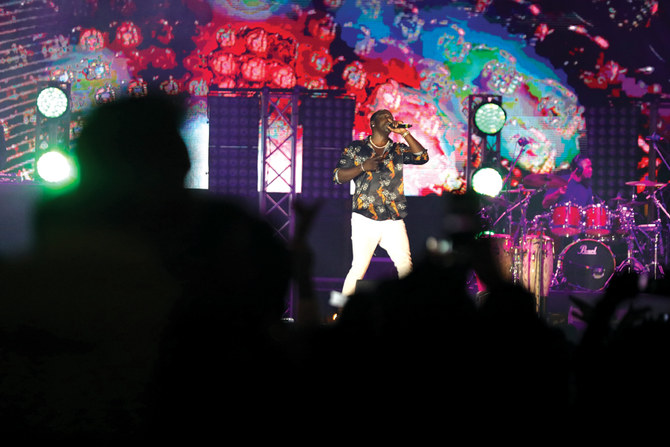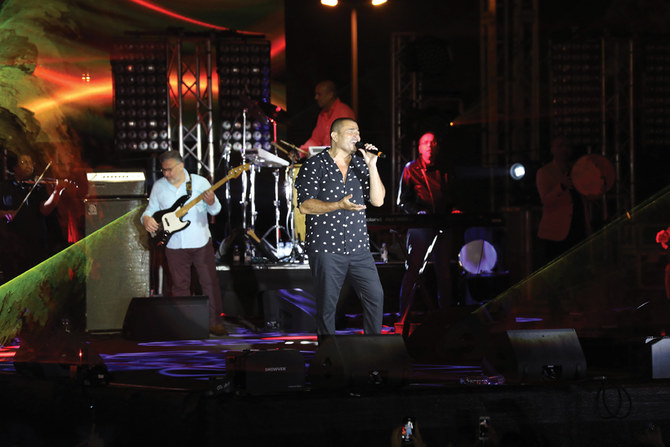DAMMAM: Pitbull or Red Bull? It was a weekend of tough choices among an incredible wealth of options on the second weekend of Sharqiah Season, with more than 80 events in nine Eastern Province cities over 17 days.
With the persistent buzz of planes overhead, it was impossible to miss the Red Bull Air Race Demo, with pilots performing high-speed aerobatics over the water near the Dammam Corniche.
Pitbull was a little more elusive, after his Thursday concert was rescheduled to Friday afternoon due to technical difficulties with his plane. But DJs Tiesto and deadmau5 were there to open the Asharqiah Music Festival in Dammam’s Life Park on Thursday, and Pitbull made up for his tardiness with a high-energy set before the sun set on Friday.
“I want you to be able to tell people, ‘I went to a Pitbull concert, and I had the time of my life, Saudi Arabia!’” the American rapper told the audience, before launching into “Time of Our Lives.” Judging by the way the crowd bounced to the beat, his mission was accomplished.
After dark, concertgoers began showing up at the music festival in droves, parking over the sidewalks and medians along the road into Life Park in a scene reminiscent of Woodstock.
Taking the stage a few hours after Pitbull, under a big bright moon on a beautifully cool night, another big-name American rapper showered Saudis with more love. “You have no idea, I’ve been waiting to get to Saudi for years, man,” Akon said, beaming as he came on stage, before launching into his song, “Gunshot.” Later, he told the crowd: “I’m seeing a tremendous change in Saudi Arabia here tonight.”
Engaging in on-stage antics with his DJ Benny Demus, who wore a sparkly green mask, Akon played some of his most popular hits, including “Smack That,” “Lonely” and “Sorry: Blame It on Me.” Like Pitbull, it was Akon’s first appearance in Saudi Arabia, and he addressed Saudis several times in between songs, saying “shukran” as they cheered him on. He wrapped things up with “I love you, Saudi… thank you for making me feel at home.”
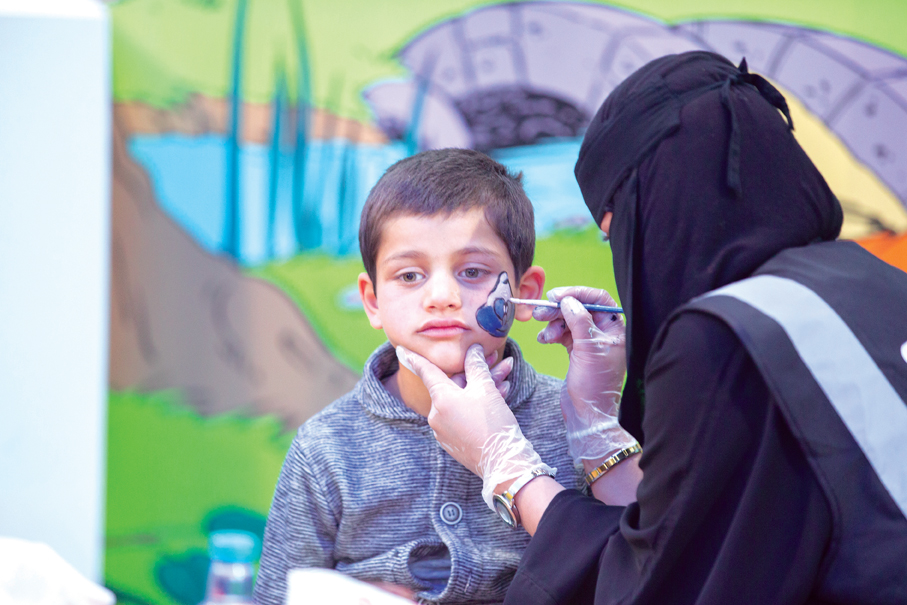
A young boy gets ready to join the fun. (AN photo by Essam Al-Ghalib)
Backstage before the concert, Akon told Arab News how excited he was to be in Saudi Arabia for the first time, especially to visit one Saudi city in particular. “First thing tomorrow morning, I’m headed to Makkah to perform Umrah.”
Right after Akon came the American-Moroccan rapper French Montana, who treated the crowd to some of his most popular songs, like “Unforgettable,” “All The Way Up” and “No Limit.”
Despite a minor visa issue, he said there was no way he was going to miss the opportunity to perform in Saudi Arabia for the first time. “They told me only me and my DJ got the visas to come,” he told the crowd. “They thought I was gonna say no. I told them, ‘Assalamu Alaikum, I’m going to Saudi Arabia!’”
Before Amr Diab took the stage, French Montana also performed his remix of the Egyptian pop singer’s “Nour El Ein”, chanting “habibi, habibi.” Backstage, Diab told reporters he was happy to be performing in Saudi Arabia again and said he would be returning during Ramadan to take his mother to perform Umrah.
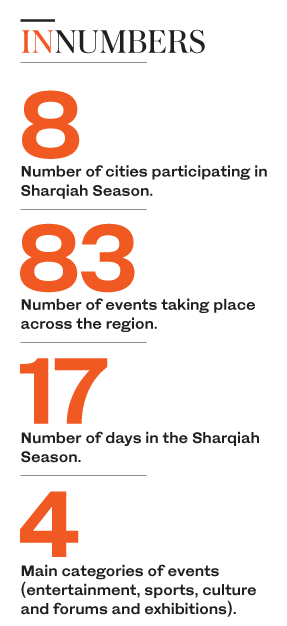 He later posted a photo from backstage on Twitter, with the message: “Thanks #Dammam for the amazing night.”
He later posted a photo from backstage on Twitter, with the message: “Thanks #Dammam for the amazing night.”
Husain Nusair, a resident of Dammam, said he enjoyed the entire concert immensely, but having Amr Diab perform in his hometown was the best experience of the night. “My favorite performance was that of Amr Diab, because it brought back a lot of childhood nostalgia,” he told Arab News, having bought a platinum ticket to the festival especially because of Diab’s performance.
In Qatif, another city that is part of Sharqiah Season, Syrian singer Assala Nasri and Kuwaiti singer Mutref Al-Mutref performed on Friday, much to the delight of regional music fans.
Ali Al-Saif, a diehard Assala fan and resident of Alkhobar, said he was beyond thrilled to have the songstress perform so close to his own hometown.
“I’ve had tickets to see her in Kuwait once before, but due to a crisis at work I couldn’t attend that concert. And now it feels like God blessed me with another chance to see my idol. I was so emotional I bought the most expensive ticket without even thinking about it. I’m taking my mom to see her too. It’s a dream come true for both of us.”
Concerts weren’t the only thing happening in the Eastern Province this weekend. The Spring Gathering opened up to visitors on Thursday evening, coinciding with the first day of spring. Visitors were treated to musical performances by Abba and Frank Sinatra tribute acts, a marketplace with products by local vendors and circus entertainers wandering through Sakura Alley, lined with artificial cherry blossom trees.
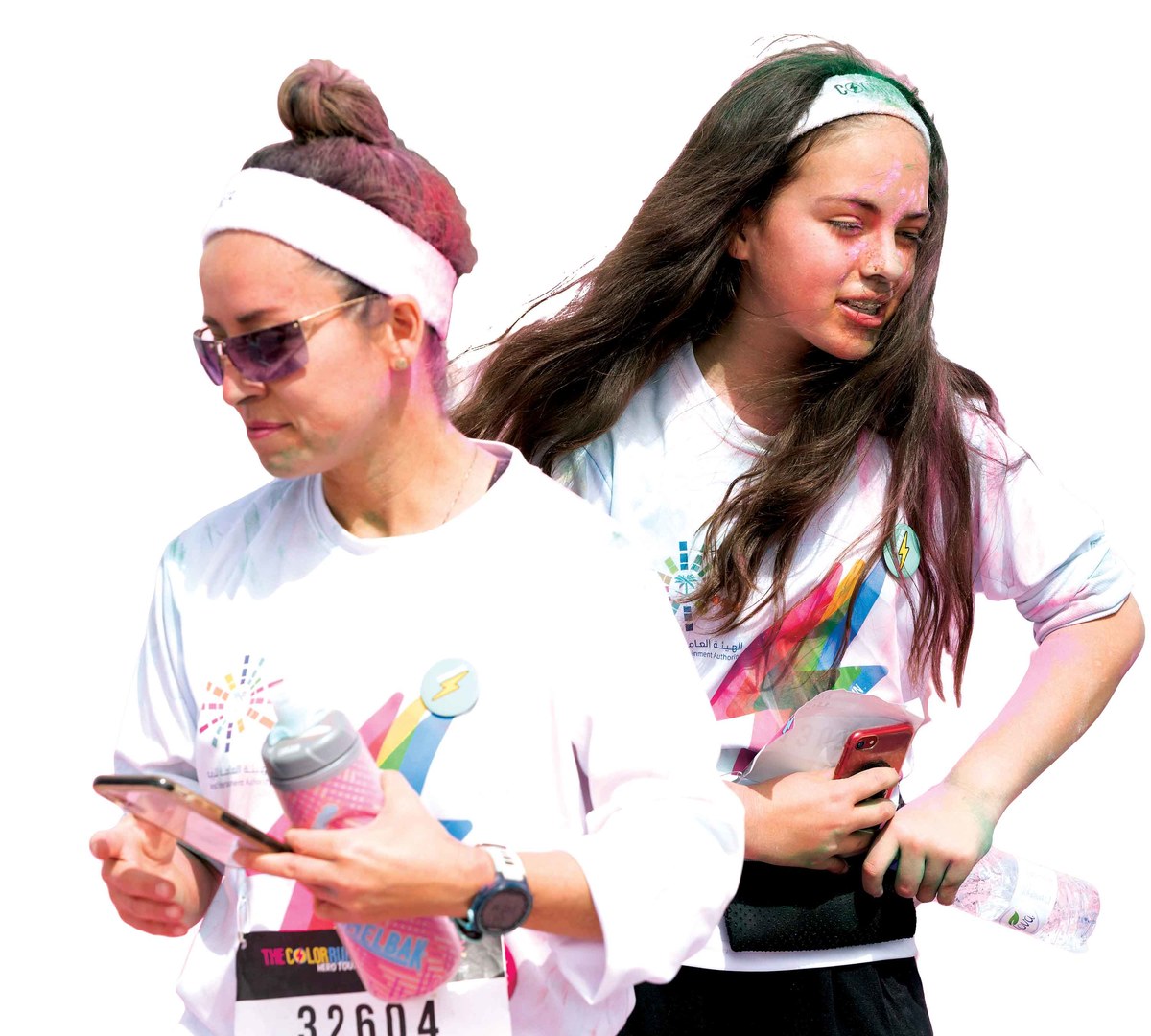
Hadeel Mousa, a resident of Riyadh, said she had come to the region to visit family and decided to check out some of the events.
“I’ve been to a Gathering event before, and they’re always beautiful and amazing. We attended the Winter Gathering in Riyadh, so this one is similar, but still unique and very beautiful.”
With another 10 Saudi Seasons to be held around the country this year, she said she’s hoping to see one in her area. “I can’t wait for the Riyadh Season,” she said. “We’re looking forward to what’s coming.”
The final word of the weekend goes to our Uber driver – they usually have their fingers on the pulse. Faisal AlHajjri, from Al-Ahsa, heard us talking about Sharqiah Season on the way back from the concerts, and was eager to share his thoughts with Arab News.
“This is something the country has needed for a long time, and so many people stand to benefit from what’s happening in Sharqiah right now,” he said. “The residents benefit because they have new entertainment options that have never been available to them before. They also spend less on travel expenses, because we no longer have to go outside of Saudi Arabia just to be able to experience entertainment.
“This is probably the weekend with the fewest Saudi visitors to Bahrain in decades, because of all the entertainment options they have right here at home. The economy also benefits from the boost it must be getting with all of the festivities. I’m so happy with what’s going on right now.”



